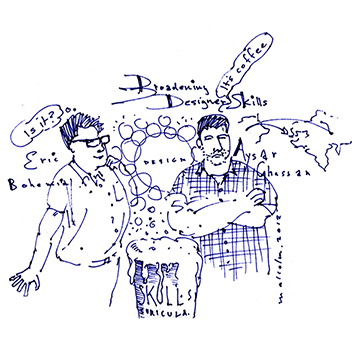The Global Studio - Incorporating Peer-Learning into the Design Curriculum
DOI:
https://doi.org/10.7577/formakademisk.1406Keywords:
peer tutoring, peer learning, learning to deal with complexity, tutor-led learning, student-led learningAbstract
In ‘tutor-led’ design education, lecturers reside at the centre of teaching & learning activities. We argue that tutor-led design education does not prepare graduates sufficiently for working in highly complex professional capacities. We outline an alternative learning environment named the Global Studio in which lecturers are more ‘distant’ in pedagogical activities. This ‘distance’ opens up learning spaces which expose students to complex project situations in preparation for professional working life. Global Studio projects are ‘student-led’ and contain explicit opportunities for peer tutoring to ensue. Feedback indicates that learners benefitted from engaging in peer tutoring. However, many students struggled with making important decisions when operating outside of the tutor-led learning environment. To maximise their benefit, we argue that student-led projects featuring peer-tutoring should be scaffolded throughout design programmes to provide students with a sufficient level of exposure to this mode of learning.
Image by artist Malcom Jones. http://www.malcomjones.com/index.htm

Downloads
Published
How to Cite
Issue
Section
License
Authors who publish with this journal agree to the following terms:
- Authors retain copyright and grant the journal right of first publication with the work simultaneously licensed under a Creative Commons Attribution 4.0 License that allows others to share the work with an acknowledgement of the work's authorship and initial publication in this journal.
- Authors are able to enter into separate, additional contractual arrangements for the non-exclusive distribution of the journal's published version of the work (e.g., post it to an institutional repository or publish it in a book), with an acknowledgement of its initial publication in this journal.
- Authors are permitted and encouraged to post their work online (e.g., in institutional repositories or on their website) prior to and during the submission process, as it can lead to productive exchanges, as well as earlier and greater citation of published work (See The Effect of Open Access).
- The author(s) must manage their economic reproduction rights to any third party.
- The journal makes no financial or other compensation for submissions, unless a separate agreement regarding this matter has been made with the author(s).
- The journal is obliged to archive the manuscript (including metadata) in its originally published digital form for at least a suitable amount of time in which the manuscript can be accessed via a long-term archive for digital material, such as in the Norwegian universities’ institutional archives within the framework of the NORA partnership.
The material will be published OpenAccess with a Creative Commons 4.0 License which allows anyone to read, share and adapt the content, even commercially under the licence terms:
This work needs to be appropriately attributed/credited, a link must be provided to the CC-BY 4.0 licence, and changes made need to be indicated in a reasonable manner, but not in any way that suggests that the licensor endorses you or your use.



